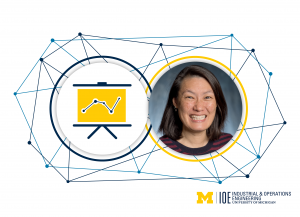Presented By: Industrial & Operations Engineering
SEMINAR: "Drivers’ Allocation of Attention Given Increasingly Autonomous Systems" — Linda Boyle

The Departmental Seminar Series is open to all. U-M Industrial and Operations Engineering graduate students and faculty are especially encouraged to attend.
Title:
Drivers’ Allocation of Attention Given Increasingly Autonomous Systems
Abstract:
Safe transport requires an understanding of the road user, their intended trip purpose and their perceptions of safety. In today’s driving environment, the human driver needs to continually switch between driving and non-driving activities. They will adapt their behavior and compensate for any perceived risks given changes in the road, weather and traffic environment. As vehicles become increasingly autonomous, human drivers will also become increasingly accustom to the vehicle assuming control and may not attend to the roadway as needed. The attention to safety critical situations is further impacted given increasing interactions with non-driving tasks while traveling. As the number of autonomous systems in our car grows, the driver’s attention to warnings and alerts diminish, making them less ready to take back control of the vehicle when the automation fails. This presentation describes some of the studies conducted to assess changes in drivers’ allocation of attention as they switch between driving and non-driving task over the course of their drive. Individual differences are observed given the type of task and task complexity. The implications of these findings for the design of future cars are discussed in this presentation.
Bio:
Linda Ng Boyle is Professor and Chair of the Industrial & Systems Engineering Department at the University of Washington, Seattle. She has a joint appointment in Civil & Environmental Engineering. She has degrees from the University of Buffalo (BS) and University of Washington (MS, PhD). She is an organizer for the International Symposium on Human Factors in Driving Assessment and co-author of the textbook, “Designing for People: An Introduction to Human Factors Engineering.” Her area of expertise is in human factors and transportation safety.
This event is sponsored by the University of Michigan HFES Student Chapter.
Title:
Drivers’ Allocation of Attention Given Increasingly Autonomous Systems
Abstract:
Safe transport requires an understanding of the road user, their intended trip purpose and their perceptions of safety. In today’s driving environment, the human driver needs to continually switch between driving and non-driving activities. They will adapt their behavior and compensate for any perceived risks given changes in the road, weather and traffic environment. As vehicles become increasingly autonomous, human drivers will also become increasingly accustom to the vehicle assuming control and may not attend to the roadway as needed. The attention to safety critical situations is further impacted given increasing interactions with non-driving tasks while traveling. As the number of autonomous systems in our car grows, the driver’s attention to warnings and alerts diminish, making them less ready to take back control of the vehicle when the automation fails. This presentation describes some of the studies conducted to assess changes in drivers’ allocation of attention as they switch between driving and non-driving task over the course of their drive. Individual differences are observed given the type of task and task complexity. The implications of these findings for the design of future cars are discussed in this presentation.
Bio:
Linda Ng Boyle is Professor and Chair of the Industrial & Systems Engineering Department at the University of Washington, Seattle. She has a joint appointment in Civil & Environmental Engineering. She has degrees from the University of Buffalo (BS) and University of Washington (MS, PhD). She is an organizer for the International Symposium on Human Factors in Driving Assessment and co-author of the textbook, “Designing for People: An Introduction to Human Factors Engineering.” Her area of expertise is in human factors and transportation safety.
This event is sponsored by the University of Michigan HFES Student Chapter.